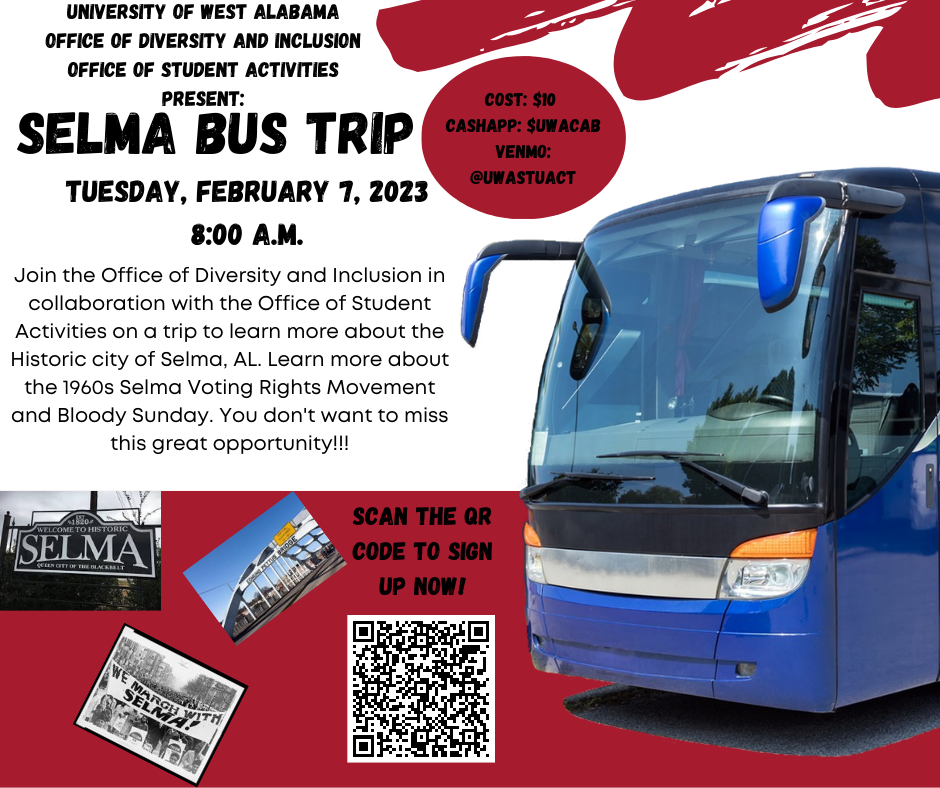
Story: Phillip Tutor
Students will meet ‘foot soldier’ of the civil rights movement in Alabama
Midway between the state capitals of Alabama and Mississippi — keystone sites of the civil rights movement — sits the University of West Alabama campus. Other locations, namely Birmingham and Atlanta, are easy drives. It’s a stroke of geographic serendipity that UWA student engagement teams want to explore.
As part of the observance of Black History Month, the university is offering students next Tuesday (Feb. 7) a one-day trip to Selma, the Dallas County city inextricably linked to Black Alabamians’ quest for equality and voting rights. In Selma, UWA students will visit the National Voting Rights Museum and Institute, hear first-hand stories of the movement, and walk across the historic Edmund Pettus Bridge, where in 1965 marchers, including future U.S. Congressman John Lewis, were beaten and tear-gassed by state troopers.
The trip is co-sponsored by the Office of Student Activities and the Office of Diversity and Inclusion.
“We’re looking for more than just speakers for Black History Month,” said Jason Gardner, UWA’s director of Student Activities. “We want to immerse students into the history. We want to take them and actually show them that these are the footsteps people walked. This is where John Lewis ran from this side of the bridge to the church.”
The goal is to create a four-year, rolling schedule of trips during Black History Month that will enrich students’ understanding of the civil rights movement. UWA’s location provides that opportunity. Gardner’s wish list is a schedule of annual trips that includes Selma, Memphis (National Civil Rights Museum and the Lorraine Motel), Atlanta (the King Center and the National Center for Civil and Human Rights), and a variety of sites for the fourth year. Options could include the Birmingham Civil Rights Museum or the Clotilda slave ship historical location just north of Mobile.
That way, Gardner said, incoming freshmen at UWA would have the opportunity to participate in each of the four Black History Month trips while they’re in Livingston.
Dr. B.J. Kimbrough, UWA’s chief diversity officer and dean of the School of Graduate Studies, shares Garner’s desire to bring students to the civil rights movement’s nearby historical sites. Discussions about organizing a Selma trip and possibly expanding it to other locations took place over the last two years, she said.
“We want to motivate our students to see that these were everyday people who walked the same grounds you walk, who do some of the same things you do,” Kimbrough said. “Several of our conversations have been centered around the fact that we wanted real-life people, everyday people who are older now, and we wanted to give our students a chance to see some of those people in person.”
Gardner and Kimbrough have arranged for at least one Selma resident — they describe her as a “foot soldier” of the civil rights movement — to speak to students and answer their questions.
“I think it has the potential to be a very powerful day,” Gardner said.
UWA has two other marquee events planned for Black History Month.
On Feb. 15, the university is hosting Liza James Howard, UWA’s first Black student, in an program called “Liza Speaks.” Howard enrolled in 1966, earned two degrees and enjoyed a lengthy career in teaching and public service. She will participate in a public conversation with Dr. Mary Hanks, chair of the Division of Nursing, and will take questions from students and faculty. The event starts at 6 p.m. in Bridges Auditorium at Wallace Hall.
On Feb. 21, the university will host a performance of acting, singing and poetry reading that Kimbrough describes as a “chronology of historical moments through the years.” That event’s guest speaker is Alabama State Rep. Robert Stewart, of Selma, who represents District 23.
